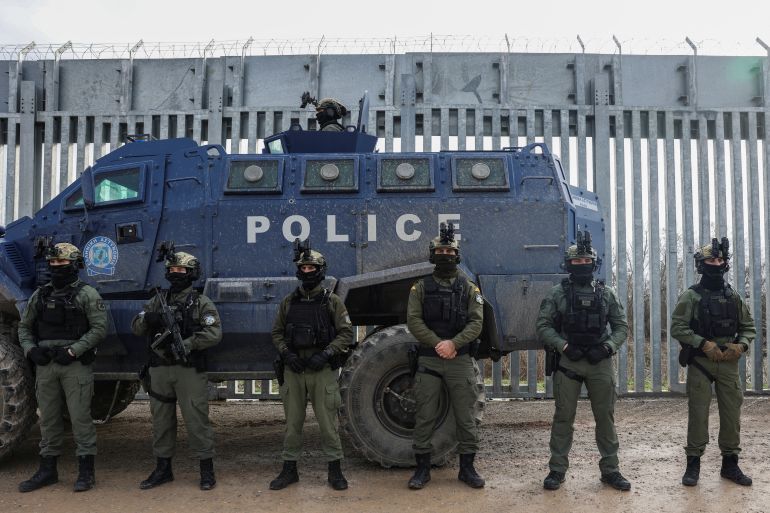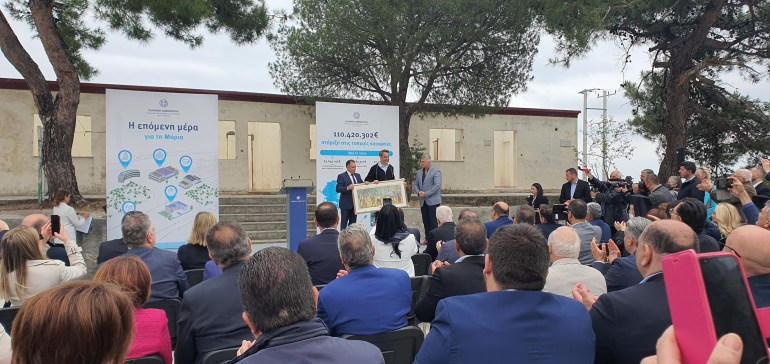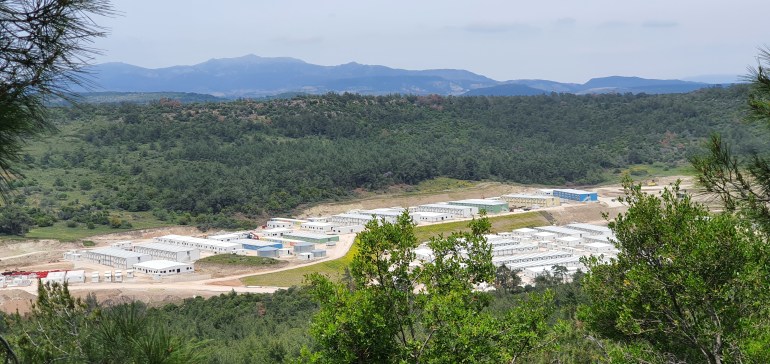Greece’s conservatives campaign on ‘firm but fair’ refugee policy
Backed by the European Union, the Greek government has toughened its border management and moved refugees out of sight.

Athens, Greece – When Notis Mitarakis took the job of migration minister, he received a baptism of fire.
In January 2020, even before he was sworn in, Mitarakis visited his constituency of Chios.
Keep reading
list of 1 itemThere were 100,000 asylum seekers in Greece, and half of them lived on the five eastern Aegean islands that had Reception and Identification Centres, including Chios. On average, there were almost 10,000 monthly new arrivals from Turkey.
A crowd of angry islanders greeted him outside the town hall, where he was to attend a special municipal council on what to do about thousands of refugees who had overflowed from the official camp and were living in squats on the beach and in town.
Mitarakis’s bodyguards ushered him inside the building and tried to close the doors, but the crowd pushed them open, smashing the glass.
It was a similar tale on Samos a few days later.
“We want them off the island. We don’t want them here,” a woman told Mitarakis as he tried to reason with a jeering congregation.
After that, Mitarakis did not even try visiting Lesvos, the north Aegean island that has absorbed about half of the asylum seekers crossing over from Turkey for the past 10 years.
But on May 12 this year, it was a very different story.
‘Exceptionally proud’
Mitarakis and Prime Minister Kyriakos Mitsotakis stood on a makeshift stage amid the ruins of Moria camp on Lesvos, once one of the largest refugee camps in Europe, along with the island’s mayor.
Before dozens of local dignitaries, the mayor thanked them and presented them with gifts.
“Ι am exceptionally proud that I kept my commitment to local communities to solve this issue,” said Mitsotakis.
“We implemented a firm but fair policy on migration. We protected our country’s borders both on land and at sea, and reduced irregular arrivals by 90 percent. We proved that the sea has borders, and those borders can and must be guarded,” he said, his last words drowned out by applause.

Mitarakis put numbers on that policy.
“During the government of Syriza [2015-19], 643,000 asylum seekers arrived on Lesvos, whereas since 2019, arrivals were 11,630,” he said.
The ruling New Democracy conservatives face a tough re-election on May 21, and see migration policy as one of their strong suits.
Greece has implemented a tough border policy many humanitarian groups and search-and-rescue watchdogs have said amounts to illegal pushbacks of potential asylum seekers at sea.
Under the Geneva Convention of 1951, supplicants may not be turned back at the border if they are seeking protection from political or religious persecution.
The Greek Border Guards and the coastguard often have not bothered to ask them, say critics.
Beating, detention, theft
Al Jazeera has reported on firsthand accounts of beatings, arbitrary detention and theft of personal belongings.
It had not always been this way. While refugee numbers were manageable, Lesvos was hospitable.
The mayor turned over a summer camp for school children and a driving school to be used as refugee housing.
A network of volunteers, formed during the post-2008 global financial crisis to help Greek families that went hungry, gathered food, medicine and clothing for refugees instead.
By 2020, the islands with reception centres had begun to feel they were pawns in a political power game between Turkey and the European Union.
When New Democracy fast-tracked new asylum applications, applicants who had been waiting for years marched through the capital of Lesvos, Mytilene, fuelling a movement among locals to shut down Moria, just 4km (2.4 miles) away.
The turning point for Greek policy came in March 2020, when Turkey unilaterally withdrew from an agreement with the EU to hold back irregular migrants.
Thousands attempted to storm the Greek land border at the Evros River, nearly overwhelming Greek police.
Security crisis
Greece saw Turkey’s move as a test of its reflexes, and thenceforth treated refugees as a security crisis more than a humanitarian one.
In September of that year, Moria was set ablaze. Police arrested a dozen Afghan refugees on charges of arson, but some islanders suspect that locals put them up to it.
“[Some people] created problems to mobilise others against them. They said these people brought AIDS, brought Ebola, they will sleep with your women. And it worked, and they turned the population against them,” Christos Moumtzis, a jeweller, told Al Jazeera.
“They are trying to assimilate the [migrants] in Greece, to have relationships, children, a mixed-up situation, a sort of marriage [of populations],” said shop owner Thanos Mitropoulos.
“I see many [refugees] with Greek girls, walking hand in hand, in a relationship.”
Many local businesses have profited from the cash handouts the EU has been giving asylum applicants while their claims are being processed, but they have had a souring effect on many.
“I think that many of them are lazy, they get subsidies, and they’ve learned to live with that. They pose for photographs … They don’t aspire to something more … I on the other hand have opened this shop, I have to keep it in business,” Mitropoulos said.
About 2,400 refugees remain on Lesvos today, a 10th of the number that lived in Moria, as the government moved most to the mainland and hired more lawyers to process their asylum applications.
Where Moria camp once stood, the government plans to build a conference centre, student housing and an innovation centre for the University of the Aegean, a music school and a sport centre. The summer camp and driving school, too, have been returned to the municipality.

In their place, the government is constructing a vast new camp 40km (25 miles) away in the middle of a pine forest, well out of walking distance of Mytilene.
The camp at Vastria will have better amenities than Moria, or the current makeshift camp set up on an artillery range at Mavrovounio, but it will be surrounded by a patrolled, double chainlink fence topped with barbed wire – all paid for by the EU.
The policy on other islands has been similar, with former camps near urban centres being turned over to local authorities and replaced by more efficient, distant facilities.
Yet, such is the sensitivity over the presence of even the out-of-sight Vastria camp that Mitsotakis did not visit it, apparently not wishing to draw attention to it.
This government reflects the complete change in Europe’s refugee policy over the past few years.
It proudly proclaims that it has prevented 700,000 irregular entries during its term, protecting Europe’s open internal borders and abolishing the status of these east Aegean islands as Europe’s buffer zones.
Not everyone agrees with the new Greek – and EU policy.
“We can’t choose between the disgrace of Moria, or the prison of Mavrovounio, or the even worse camp at Vastria,” Communist MP Maria Komninaka told Al Jazeera.
“We believe that people should quickly receive their papers and move from the islands to the mainland and from there to the countries they’re trying to get to.”